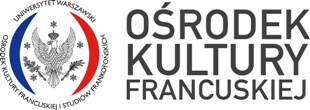17.12 – The securitization of nuclear fuel supply in the aftermath of Russia’s war in Ukraine | dr Teva Meyer (Université de Haute-Alsace)

Center for French Culture and Francophone Studies and the Faculty of Political Science and International Studies at the University of Warsaw invite you to the first session of the “Geopolitical Tuesday” seminar entitled:
The securitization of nuclear fuel supply in the aftermath of Russia’s war in Ukraine
dr Teva Meyer (Université de Haute-Alsace)
Tuesday 17 December 2024 at 3 pm (CET)
Registration : seminarium.okf@uw.edu.pl
Online seminar in English
Please note that the meeting will be recorded solely for scientific purposes. Participation in the meeting constitutes consent.
Summary
10:44 PM, March 24, 2022. At Brno Airport (Czech Republic), an Ilyushin 76 comes to a stop after a two-and-a-half-hour flight from Moscow. Despite the European Union’s airspace being closed to Russian planes since the invasion of Ukraine, the aircraft benefits from an exemption. Inside the freighter lies two years’ worth of fuel to supply fuel for Czech nuclear power plants.
The Russian invasion of Ukraine in 2022 reignited debates over Moscow’s control of the global nuclear fuel market, leading to vastly uncoordinated securitization strategies on both sides of the Atlantic. Responses ranged from switching to non-Russian alternative suppliers and supporting the construction of domestic fuel production facilities to taking no action at all. These policies echo past experiences with disruptions in gas exports, raising fears that the Kremlin might leverage nuclear fuel trade as a coercive diplomatic tool. However, is this comparison valid? Are nuclear fuel trades politically akin to fossil fuel trades, and could exporters use them coercively? Why are European and North American countries following different paths to tackle their dependencies over Rosatom’s fuel? Why are Europeans still divided despite the existence of a common nuclear fuel supply policies? In this communication, we’ll argue that Russia’s capacity to weaponize nuclear fuel trades against Europe and the US is weak but not nonexistent, posing a threat under specific conditions, which are still not tackled by current securitization policies.
Bio
Teva Meyer is an Associate Professor of geography at the Université de Haute-Alsace (France) and a non-resident researcher at the Institut Des Relations Internationales et Stratétiques (IRIS). He explores the political dimensions of the interactions between space and nuclear technologies using critical geopolitics. His last book “Géopolitique du nucléaire” was published in 2023 by Les Editions du Cavalier Bleu.
